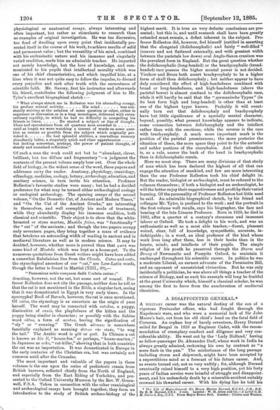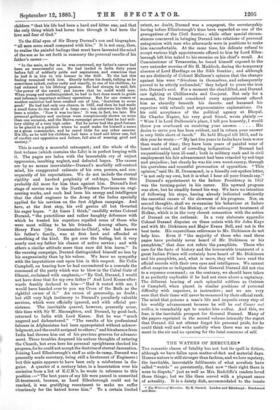A DISAPPOINTED GENERAL.*
A MILITARY career was the natural destiny of the son of a vigorous Peninsular officer, who bad fought through the Napoleonic wars, and who wore a memorial lock of Sir John Moore's hair, cut from his old chief's head on the fatal field of Corunna. An orphan boy of barely seventeen, Henry Durand sailed for Bengal in 1829 as Engineer Cadet, with the recom- mendation of exemplary conduct and diligence and very con- siderable ability. He went out by the Lady Holland,' having as fellow-passenger Dr. Alexander Duff, whose work in India he always greatly admired, reckoning his own by contrast as "a mere flash in the pan." The misfortunes of the long passage including storm and shipwreck, might have been accepted by a superstitious mind as a forecast of his future career. And, as events turned out, not so very unfitly ; for, although Durand eventually raised himself to a very high position, yet his forty years of Indian service were brimful of struggle and disappoint- ment, and his melancholy death by a miserable accident suitably crowned his thwarted career. With his dying lips be told his • The Life of Major-General Sir Henry Marion Durand, H.C.S.I., C.B., B.B. By H. M. Durand, C.S.I. S vols. London : W. H. Allen and Co.—A Letter to H. M. Durand, Big., CS I. From Major Evans Bell. London Chatto and Windns.
children " that his life had been a hard and bitter one, and that the only thing which had borne him through it had been the love and fear of God."
To the filial eyes of Sir Henry Durand's son and biographer, " all men seem small compared with him." It is not easy, then,
to realise the painful feelings that must have lacerated the mind of the son as he set forth in summary the personal results of his father's career :—
" In the main, so far as he was concerned, my father's career had been an unsuccessful one. He had landed in India forty years before full of soldierly pride and aspirations, and conscious that he had it in him to win honour in the field. To the last this feeling remained with him. Shortly before his death, talking as he sometimes talked, rather sadly and wearily, to one of his children, he bad referred to his lifelong passion. He had always, he said, felt the power of the sword,' and known that he could wield men. When young and undistinguished, he had in fact done much to guide and influence important military operations. But for one reason or another ambition had been crashed out of him, ` doubtless to some good.' He had had only one chance, in 1857, and then he had made a small force do the work of a large one ; but otherwise his life had been a misfire. Now it was too late.' It was, in fact, too late. His personal gallantry and coolness were conspicuously shown on more than one occasion, and the Malwa campaign proved that he had mili- tary ability of a very high order. Bat he never had the good fortune to be placed in a position where he could make for himself a name as a great commander, and he oared little for any other success. His life, as he told his children, had been a hard and bitter one, full of conflict and opposition and failure, full also of wearing grief and anxiety."
This is surely a mournful retrospect ; and the whole of the first volume (which contains the Life) is in perfect keeping with it. The pages are laden with the lamentable cry of unjust oppression, insulting neglect, and defeated hopes. The causes are by no means inscrutable—Durand's morbidly self-centred mind, his exaggerated estimate of his own powers, and con- sequently of his expectations. We do not include the eternal rigidity and knotted perplexity of red-tape, because this probably did more for him than against him. Durand's first
stage of service was in the North-Western Provinces on engi- neering works, and such had been his energy and intelligence that the chief engineer to the Army of the Indus specially applied for his services on the first Afghan campaign. And here, at the first step, his evil genius all but thwarted his eager hopes. " At times I think," candidly writes Colonel Durand, "the punctilious and rather haughty deference with
which be treated his superiors repelled some of those who were moat willing to be his friends. Among others, Sir Henry Fane [the Commander-in-Chief], who had known his father's family, was at first hurt and offended at something of the kind. He got over the feeling, but it very nearly cost my father his chance of active service ; and with others a similar attitude more than once did him harm." In the ensuing campaign, Durand distinguished himself no less by his magnanimity than by his valour. We have no sympathy with the imputations cast upon him in this respect. Sir Colin 'Campbell, on hearing how he had surrendered to a comrade the command of the party which was to blow-in the Cabal Gate of
Ghazni, exclaimed with emphasis,—" By God, Durand, I would not have done that for my own father !" And Lord Keane after- wards frankly declared to him—" Had it rested with me, I would have handed over to you my Cross of the Bath as the rightful owner of it." An excess of generosity, no doubt ; but still very high testimony to Durand's peculiarly valuable services, which were officially ignored, and with official per- .sistence. The inevitable quarrel, however, presently arose, this time with Sir W. Macnaghten, and Durand, by good-luck, returned to India with Lord Keane. But he was " much angered and disheartened." " The results of his professional -labours in Afghanistan had been appropriated without acknow- ledgment, and the credit assigned to others;" and his absence from India had thrown him out of his previous grooves for advance- ment. These troubles deepened his serious thoughts of entering the Church, but even here his personal uprightness checked his progress, for he could not accept the doctrine of eternal damnation. Joining Lord Ellenborough's staff as aide-de-camp, Durand was presently made secretary, being still a lieutenant of Engineers ; but this again appears to have been only a misfortune in dis- guise. A quarter of a century later, in a lamentation over his omission from a list of K.C.B.'s, he wrote in reference to this position :—" The best years of my life were passed in unmerited ill-treatment, because, as Lord Ellenborough could not be reached, it was gratifying resentment to make me suffer vicariously for the hatred borne him." To a certain limited extent, no doubt, Durand was a scapegoat, the secretaryship having before Ellenborough's time been regarded as one of the prerogatives of the Civil Service ; while other special circum- stances concurred in bringing Durand into relations of personal antagonism with men who afterwards were in positions to make him uncomfortable. At the same time, his delicate refusal to accept various high appointments offered to him by Lord Ellen- borough left him naked to his enemies on his chiefs recall. As Commissioner of Tenasserim, he found himself exposed to the very untender mercies of Sir H. Maddock, during the temporary absence of Lord Hardinge on the Sikh frontier ; and although we are distinctly of Colonel Malleson's opinion that the charges against him were "frivolous in themselves, and subsequently proved to be utterly unfounded," they helped to press the iron into Durand's souL For a moment the cloud lifted, and Durand saw fighting at Chillianwala and Goojerat. But only for a moment, for Durand considered every appointment offered him as absurdly beneath his deserts, and harassed his superiors with refusals and argumentative explanations. On his cold acceptance of the political agency at Bhopal, Sir Charles Napier, his very good friend, wrote plainly :- "Were I in Lord Dalhousio's place, I tell you honestly, I would throw you overboard on receiving your answer His desire to serve you has been evident, and in return your answer is very little short of insult." He held Bhopal till 1853, and in this year he wrote :—" My last five years in India have been worse than waste of time ; they have been years of painful wear of heart and mind, and of corroding indignation." Durand had unquestionably been ill-used ; both in military rank and in civil employment his fair advancement had been retarded by red-tape and prejudice; but clearly he was his own worst enemy, through his querulous and resentful provocation of opposition. " This opinion," said Mr. H. Drummond, in a friendly out-spoken letter, " is not only my own, but it is what I hear all your friends say."
Durand's appointment to the Indore Presidency in 1857 was the turning-point in his career. His upward progress was slow, but he steadily forced his way. We have no intention of following his steps, having already indicated sufficiently the essential causes of the slowness of his progress. Nor, on second thoughts, shall we re-examine his behaviour at Indore during the crisis of the Mutiny, or the subsequent treatment of Holkar, which is in the very closest connection with the action of Durand on the outbreak. In a very elaborate appendix Colonel Durand disputes on these points with Sir John Kaye and with Mr. Dickinson and Major Evans Bell, and not in the best taste. His supercilious references to Mr. Dickinson do not help him. Even if " the majority of those who read these pages have probably never heard of Mr. Dickinson or who pamphlets," that does not refute the pamphlets. Those who care for the facts of history and the honourable treatment of a great Indian Prince will certainly have heard of Mr. Dickinson and his pamphlets, and, what is more, they will have read the official records with their own eyes and intelligence. We cannot affect surprise or indignation that General Durand did not rise to a supreme command ; on the contrary, we should have taken it as perfectly explicable if he had not risen above a captaincy. The different bearing of such splendid soldiers as Outram or Campbell, when placed in similar positions of personal difficulty with superiors, is instructive ; and we are very sure that their fame will never be measured by their official rank. The mind that poisons a man's life and imperils every step of his worldly advancement because he will be aut Ccesar aut nullus, is remarkably apt to render him nulls& And this, we fear, is the inevitable prospect for General Durand. Many of the papers reprinted in the second volume intensify the regret that Durand did not oftener forget his personal pride, for he could think well and write usefully when there was no excite- ment in the air and no opening for the fatal concerns of self.



































 Previous page
Previous page